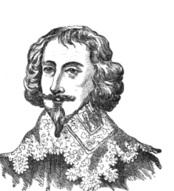
1577 - 1643 Person Name: G. Sandys (1557-1643) Author of "All from the sun's uprise" in Worship Song Sandys, George, son of Dr. Edwin Sandys, Archbishop of York, was born at Bishopthorpe Palace, York, in 1577, and educated at St. Mary Hall and Corpus Christi College, Oxford. For some years he devoted himself to travelling in Europe and Asia, and published in 1615 a curious account of his experiences. After visiting America, where he was for a time the Treasurer of the British Colony of Virginia, he became, on his return, a Gentleman of the Privy Chamber of Charles I. He died at Bexley Abbey, Kent, March 1643. His publications included his Traveller's Thanksgiving; the prose work on his travels, A Relation of a journey begun in 1610, &c, 1615; a translation of the Metamorphoses of Ovid; and Grotius's tragedy of Christ's Passion. His productions which most nearly concern hymnology were:—
(1) A Paraphrase upon the Psalmes of David, and upon the Hymns dispersed throughout the Old and New Testaments. London: at the Bell in St. Paul's Churchyard. MDCXXXVI.
(2) A Paraphrase upon the Divine Poems by George Sandys. London: at the Bell in St. Paul's Churchyard. M.DCXXXVIII. This volume contained the Paraphrase of the Psalms, paraphrases upon Job, Ecclesiastes, the Lamentations of Jeremiah, and the Songs collected out of the Old and New Testaments.
(3) His paraphrase of The Song of Solomon was published in 1642. The most available form of these works is the Rev. R. Hooper's reprint of Sandys's Poems, in Smith's Library of Old Authors.
A few only of Sandys's versions of the Psalms are found in modern hymnbooks, although they were set to music by Henry Lawes. His influence, however, upon later paraphrasers was considerable. The following, together with a few others annotated under their respective first lines, are in common use:—
1. How are the Gentiles all on fire. Ps. ii.
2. Lord, for Thee I daily cry. Ps. lxxxiv.
3. My God, Thy suppliant hear. Ps. lxxxvi.
4. Praise the Lord enthroned on high. Ps. cl.
5. Sing the Great Jehovah's praise. Ps. lxvi.
6. Thou, Lord, my witness art. Ps. cxxxi.
7. Thou who art [dwellest] enthroned above. Ps. xcii.
8. You, who dwell above the skies. Ps. cxlviii.
These paraphrases as in common use are in the form of centos.
--John Julian, Dictionary of Hymnology (1907)
====================
Sandys, G.., p. 994, i. Another cento from his Paraphrase upon the Psalmes of David, &c, 1638, as "Let God, the God of battles, rise" (Ps. lxviii.), is in the Hymn Book for Use in Wellington College, 1902.
--John Julian, Dictionary of Hymnology, New Supplement (1907)
George Sandys
